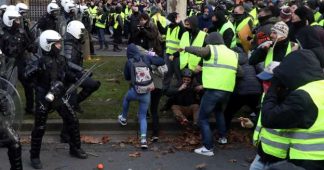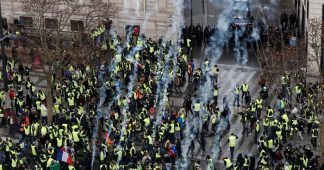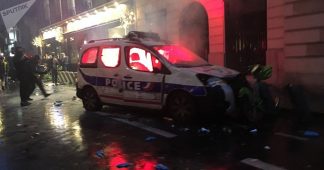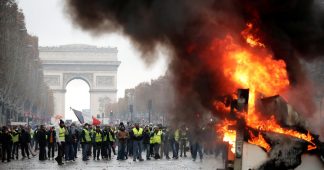This is the English translation of an article in French (Translation Bruno Drweski and Bruce Stewart)
You may read the original here France: Le plus grand acquis des Gilets jaunes: la reconstitution du lien social
By Bruno Drweski
Saturday 8 December. This morning a peaceful but angered crowd demonstrated under a barrage of police gas and flash-balls from the Arc de Triomphe to the other end of the Champs-Elysées not far from the Palace where the President of France is in now residence. Facing them at the Arc de Triomphe, as I witnessed, were contingents of the regular French gendarmerie and Compagnie républicaines de Sécurité with trained dogs, accompanied by members of private security agencies comprised of recruits from the former Foreign Legion together with other police forces apparently coming from foreign countries (according to media sources). Since none of the demonstrators reacted to those provocations the police lacked any pretext to attack, yet it seems they have been instructed to pump gas into the crowd more or less continuously to trigger a violent reaction and hence legitimise a resort to repression of the anti-Government demonstration on their part. It has not worked: the protesters have kept their cool again, with very few exceptions.
Since the outset, the yellow vests (gilets jaunes) have done everything in their power to avoid anything that would give rise to divisions in the movement, but certain activists who later proved to be linked with the far right attemped to mount an operation of their own on the Champs-Élysées, using loud-speakers to broadcast their anti-migrant obsession. As long as they echoed the demand for a people’s referendum they were applauded by the others but when they began to rant about a “migratory invasion” – citing the UN summit of Marrakech without reference to the new era of slavery being inaugurated there – the demonstrators came to the defence of the unity of their movement, vocally demanding that the right-wing group shut up their racist shop and leave. After that they were not seem again.
The numerous teams of foreign-television journalists on the scene including Russian, Turkish, Japanese, Canadian, Lebanese, Iranian, and other services, have been warmly applauded by the yellow vests. Except for members of RTL radio — indeed, I could not see any French media on the Champs-Elysees, doubtless on account of their unpopularity among the demonstrators who knew how grossly they had misrepresented the events in their reports so far, magnifying certain aspects of the popular protest and falsifying others. This week, for instance, Ruth Elkrief (a starring newsman on pro-régime BFM TV), scolded a yellow vest during a so-called “debate” who had dared to say that the police had gassed them during the earlier demonstration, telling him that it as only permitted to used the word “gassed” about the victims of Nazi genocide at Auschwitz. It’s difficult to convey how much that piece of right-wing sophism appalled the demonstrators who heard it, considering that for them French is a living language whose words are used to describe things as they are, both materially and morally. Gas was used : they were gassed.
The Champs-Elysées protests have generally been calm though the demonstrators are certainly angry that Macron – who has met very few of their demands – still refuses to address them in his own person. For the protesters, this is a further mark of his disrespect for popular feelings, consistent with the policy of gassing peaceful demonstrators in order to provoke a violent reaction which the government can then brand as criminal. Yet, in intervals between the bursts of tear-gas and flash-balls, the demonstrators are getting on with the discussion of the crisis. All around me I hear questions being raised about the European Union and the need to form grassroot assemblies in neighborhoods, towns, villages, and businesses in order to control the exercise of autocratic power by elected officials. Talk of a Sixth Republic can be heard on many lips. And, while the demonstrations are generally free from any signs of definite political affiliation, the demands being made on all sides are consistent with the spirit of French egalitarianism and, as such, close to the traditional sentiments of the French Left. Frequent mention is made of the symbols of the French Revolution as a reminder to the government and, if Macron is being identified with Marie Antoinette, there are also references to the lists of grievances (cahiers de doléances) of the French Revolution, the Republican resistance to the ancien regime with its challenge to the laws and the monarchy itself, and – of course – the “Marseillaise” itself. It is a notable fact that Left-wing activists, excepting a few members of the SNCF, CGT and SUD trade unions, are rarely visible at the demonstrations : it remains as it began la manifestation des gilets jaunes.
One change in the composition of the Saturday demonstrations is worth mentioning : conspicious : compared with the previous occasion, I noted today an influx of high-school students and a decrease in the number of pensioners on the march. Is a new generation now entering the fray at a time when the the energy of the police is starting to wear down? Aside from that, lots of yellow vestsare still flocking from the provincial towns and cities of France. What appears to be happening now is that a great mass of politically-conscious people who demonstrated to such little effect over years during “days of action” organised by trade unions has now been replaced by a popular mass without any “political culture” of that kind who have come to maturity in the last three weeks, bringing “peripheral France” (La France periphérique) to the center of the debate. At this point, four out of five Frenchmen and women are taking a concrete stand against the neo-liberal policies practiced by the government for the last thirty years. Meanwhile, the institutional Left prefers to hold its demonstrations separately at its traditional working-class venues in formerly working-class neighbourhoods, now becoming distinctly haunts of the “bourgeois-Left”. There, despite the anti-capitalist symbols and placards which adorn their marches, there are almost no policeman in attendance. And when some isolated bursts of violence from “rioters” unrelated to the main event occurred, just as the demonstration at Place de la République was ending. Suddenly the police were all around the Champs-Elysees tracking down the “new people” who have freshly arrived in French politics on this momentous occasion.
The arrival of high-school students on the Champs-Elysées has introduced a new touch to the protest, as coming from the immigrant quarter of the city. In general, to date, immigrants have been afraid to demonstrate, given that they have already been through several years of Islamophobia and bombardment by anti-terrorist propaganda with more than 5,000 night-time searches in their homes during the recent state of emergency – security provisions which have now been written in law. In spite of this we now see high-school students from the immigrant community arriving in small groups with their friends, bring a welcome diversity to the demonstration of the yellow vests.
During the week past, the media has been bombarding the public with talk of violence and rioters, insisting that all those who came out this Saturday would be violent extremists determined to destroy or even to murder. Such propaganda is intended to create a party of fear (parti de la peur), thus reducing the number of demonstrators while legitimizing counter-attacks while enabling the current regime to reclaim the country from the widespread mood of political dissent which is embodied by the demonstration itself. Yet, despite all those efforts, an IFOP poll published on the eve of the demonstration has shown that 78% of French people still supported the yellow vests and their demands.
Besides the psychological pounding by television, inhabitants of the predominantly immigrant neighbourhoods – and younger people in particular – have been made the target of a tsunami of Whatsapp and Twitter messages supposedly broadcast by a Muslim man or woman pronouncing that no Muslim should join the protest since the policemen are going to target darker skins while the “white” protesters only want to “take away the only thing left for you, your religion”. That, along with the argument that high-school students who joined the student mobilization that spread throughout France over the weekend to oppose the new educational reforms were stupidly allowing themselves be manipulated by the enemies of God, Arabs, and Blacks in France. The impact of these messages explains why so many of the younger demonstrators of Arabs or Black origin whom one meets with among the demonstrators – either high school students or workers of small factories from provincial towns – arrived as part of a tight groups, thus affording them the security and assurance needed to voice their opinions alongside other French people at the demonstration.
It is likely that the propaganda campaign which has been targeting both the general population and the immigrant communities of France has emanated from special services in the French police force actuated by instructions from above. Activist friends of mine in the suburbs – both community and mosque —tell me that the Muslims massively support the yellow vests in keeping with their class situation, but that they are genuinely afraid of drawing the adverse attention of the police and media down upon themselves by joining in the demonstrations. As I left on at last, I met a young worker who was looking at a map of Paris, seeking to get back home after dark and hardly knowing how to proceed. Just a moment before, I had given directions to some others from the provinces who seemed lost in Paris and I so asked him was he from the provinces too. No, he told me, he was from a young worker of Algerian extraction from nearby Massy who had never visited metropolitan Paris in his life. Such is the atomised society created here by neoliberal capitalism that one can live couple of subway stops outside Paris and never visit the city. [New para]
I then accompanied him to a far-off distant metro station which still remained open and we talked along the way. He told me that this was his first demonstration because, up to now, he has always been afraid to join in because of the color of his skin. It was not the protesters who scared him but the police and the journalists. He told me he believed that France will never return to the way it was three weeks ago because the people had grown up, especially those in peripheral France who have started to think for themselves and now find that the great mass of people think exactly as they do about the issues that matter in France today. Not knowing anything about me, he asked a question : “Sir, do you think that all the demands of the protesters can be attained if France does not leave the European Union?!!” Hence it seems that, unlike previous demonstrations in the capital, the issue of the European Union is now in everybody’s mind. Initially, during the first two demonstrations, it was only the question of tax havens, tax evasion, now it is the question of creating permanent people’s assemblies and reflecting on what the EU really is.
I do not know what will happen because everything is still fluid and disorganized but certainly the people have matured and whatever the outcome, France will never be just as it was before these last few weeks. A big thank you to M. Macron and his casting team! The people of France have regained an awareness of their own political strength and taken note of the intellectual and moral decrepitude of the ownership class and the governing elite. Those in power don’t yet seem to have taken this fact into account or to be capable of grasping, like Marie Antoinette, what true misery is until she was imprisoned in the Conciergerie. There, in the few tragic weeks left to her, she grew up fast enough. For the pubescent boy now haunting the presidential palace, in awe of big bankers, his protective matron and his gang of thugs, the position is sadly like hers in that revolutionary period. It is possible that some perceptive notables of “old France” or else the “new globalized bourgeoisie” already grasp that they will have to make a scapegoat of some of their offspring, even Macron himself. Here their problem is that no French politician, except perhaps the Leftist Melenchon who still has the minimum of moral authority needed to be heard in the country, can serve the government as an credible interlocutor with the yellow vests. On the other side, while the yellow-vests demonstration has not yet produced any clear programme as to a new form of political and social organization, the trade unions base and Left-wing parties, together with such unions as the CGT chemical federation, and the central region of the CGT along with Marseille[s], have already expressed sympathy with the movement and make well be prepared to join forces with it for the future.
A notable feature of the new popular movement is the feeling of brotherhood which has now spread through the streets of Paris between people from different parts, different classes, different generations, people of different religions and ethnic origins, rebuilding social links where the trend towards social atomization, capitalist globalization, bourgeois and petty-bourgeois individualism had resulted in isolation, especially in remote areas where people have come to understand that they are akin in their sufferings under austerity with so many in the rest of the France. They know now that they are part of something larger. Today, the country is divided between the four fifths who are “outside the system” and the one fifth who are “in the system”, wavering between getting tough and making concessions to the former. With the European Union in crisis and on the eve of elections that will be all the more risky because of the yellow vests, and with NATO in crisis too, it is fair to say that capitalism is in crisis and liberal democracy is in crisis also. That amounts to a lot of crisis, especially considering that France is only one of the fever-points in a sick body-politic that now encompasses the entirety of the economically globalized world.











